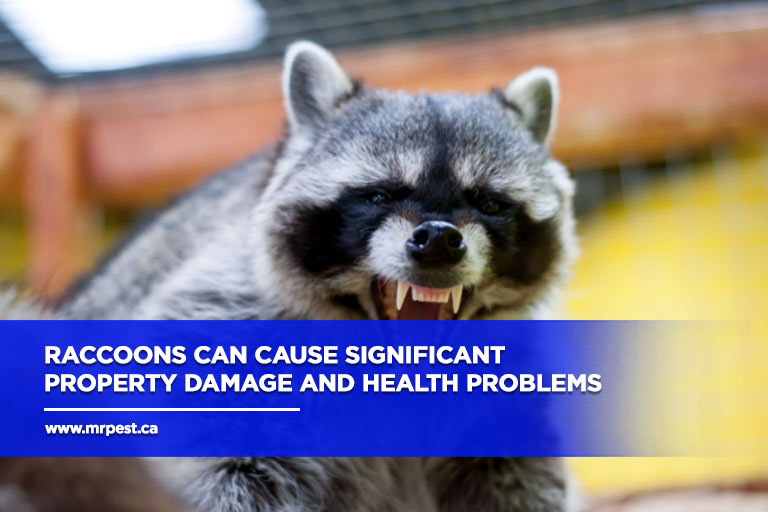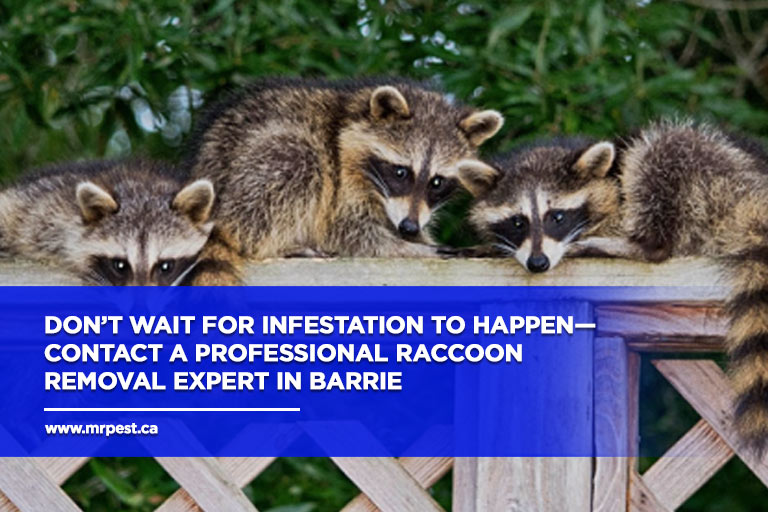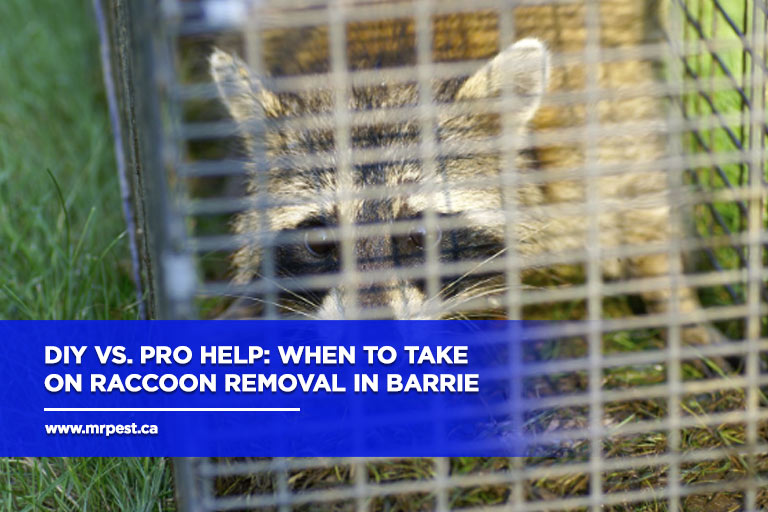Raccoon infestations are a prevalent concern for homeowners in Barrie, necessitating swift action to mitigate property damage and health risks. Determining the appropriate approach—whether to tackle raccoon removal as a DIY project or enlist professional assistance—is vital for effective and safe eradication while navigating the complexities of wildlife management in urban settings.
Understanding Raccoon Behaviour
Raccoon infestations can be a persistent issue for homeowners in Barrie, Ontario, requiring a nuanced understanding of raccoon behaviour for effective management. These nocturnal creatures are renowned for their adaptability and resourcefulness, often seeking shelter in attics, chimneys, and crawl spaces.
Exploring raccoons’ habits and breeding seasons helps homeowners understand infestation challenges and choose effective removal methods.
Natural Habits
Raccoons, native to North America, are nocturnal creatures known for their resourcefulness and adaptability. With their distinctive mask-like facial markings and ringed tails, they are easily recognizable. In urban areas like Barrie, raccoons gravitate towards human habitats, seeking shelter in attics, chimneys, and crawl spaces. They are opportunistic feeders, with a diet consisting of both plant matter and small animals, making them adaptable to various environments.
Breeding Seasons
Understanding raccoon mating seasons is crucial for homeowners, as infestations are more prevalent during these periods. Mating typically occurs from January to March, with females giving birth to litters of kits in April or May. This increase in raccoon activity during the breeding season often leads to encounters with homeowners, prompting the need for proactive measures to prevent infestations.
Risks Associated with Raccoon Infestations

Raccoon infestations pose significant risks to both property and health. In this section, we’ll delve into the various dangers associated with these unwelcome visitors, from property damage to potential health hazards, highlighting the importance of prompt and effective removal measures.
Property Damage
Raccoons can cause extensive damage to residential properties, posing a threat to both the structure and its occupants. They are notorious for tearing apart insulation, chewing through electrical wiring, and creating entry points in roofs and walls. Additionally, their habit of defecating in communal latrines can lead to foul odours and unsanitary conditions within the home.
Health Risks
Beyond property damage, raccoon infestations pose significant health risks to humans and pets. Raccoons are carriers of various diseases, including rabies, roundworm, and leptospirosis, which can be transmitted through contact with their saliva, feces, or urine. Inhalation of airborne spores from raccoon feces can also lead to respiratory issues and other health complications, emphasizing the importance of prompt removal and thorough sanitation.
DIY Raccoon Removal Techniques
Choosing between DIY raccoon removal and professional assistance in Barrie requires careful consideration of various factors.
Traps and Repellents
-
Live Traps
Utilize humane live traps to capture raccoons without causing harm, then release them in suitable habitats away from residential areas. Ensure the traps are large enough to accommodate raccoons and check them regularly to prevent unnecessary stress or injury.
-
Deterrents
Implement deterrents such as motion-activated lights, ultrasonic sound devices, or natural repellents like ammonia-soaked rags to discourage raccoons from returning to your property. Rotate deterrent methods periodically to prevent raccoons from becoming accustomed to them.
-
Safe Handling
Follow safety guidelines for handling traps and chemical repellents, minimizing risks to both humans and raccoons. Wear protective gear, such as gloves and masks, when dealing with raccoon-infested areas and thoroughly sanitize equipment after use to prevent cross-contamination.
Sealants and Exclusion
-
Property Inspection
Conduct a thorough inspection of your property to identify potential entry points and vulnerable areas where raccoons may gain access. Check for signs of raccoon activity, such as droppings, paw prints, and gnaw marks, to pinpoint entry points accurately.
-
Sealant Application
Seal gaps, cracks, and openings using durable materials such as metal flashing, heavy-duty wire mesh, or foam insulation to prevent raccoons from entering your home. Pay special attention to areas around roof vents, chimneys, and utility penetrations, as these are common entry points for raccoons.
-
Habitat Modification
Remove attractants, such as food sources, pet food, and accessible garbage bins to deter raccoons from frequenting your property. Keep outdoor areas clean and tidy, and store food and garbage in secure containers to minimize the risk of attracting raccoons.
When to Seek Professional Help

When it comes to raccoon management in Barrie, homeowners often find themselves at a crossroads: should they tackle infestations themselves or enlist professional help? Understanding the behaviour of these clever creatures and the risks they pose is essential for making informed decisions.
Severity of Infestation
-
Assessment
Assess the extent of the infestation, considering factors such as the number of raccoons present, the extent of property damage, and the duration of their residency. Look for signs of aggression or territorial behaviour, as these may indicate a more severe infestation requiring professional intervention.
-
Complexity
Complex or extensive infestations may require professional expertise to ensure thorough removal and prevention measures are implemented effectively. Consider consulting with a licensed wildlife control specialist to assess the situation and determine the most appropriate course of action.
Safety Concerns
-
Risk Assessment
Evaluate the risks associated with DIY removal attempts, considering factors such as the potential for injury, exposure to disease, and handling aggressive raccoons. Take into account your level of experience and comfort with wildlife handling, as well as any physical limitations that may affect your ability to safely remove raccoons from your property.
-
Professional Expertise
Professional exterminators possess the necessary training, equipment, and experience to handle raccoon infestations safely and effectively, minimizing risks to both homeowners and wildlife. They can implement humane removal techniques and provide follow-up services to ensure the infestation is properly addressed and preventative measures are put in place.
Legal and Ethical Considerations
-
Regulatory Compliance
Familiarize yourself with local regulations governing the humane treatment and removal of wildlife in Barrie to ensure compliance and avoid legal repercussions. Some municipalities may require permits or licenses for wildlife removal activities, so be sure to research the applicable laws and regulations in your area.
-
Ethical Responsibility
Consider the ethical implications of DIY removal methods versus professional intervention, prioritizing the welfare of both humans and raccoons. Professional exterminators are trained to minimize stress and harm to wildlife during removal procedures, ensuring a humane and ethical approach to raccoon management.
Professional Raccoon Removal in Barrie: Keeping Your Home Wild-life Free
While DIY methods may suffice for minor infestations, seeking professional assistance is advisable for more extensive or challenging situations. Remember, your safety and the welfare of wildlife are paramount. For expert raccoon removal services in Barrie, contact Mr. Pest Control at 1-888-794-PEST. Let us help you reclaim your home from unwanted intruders.



